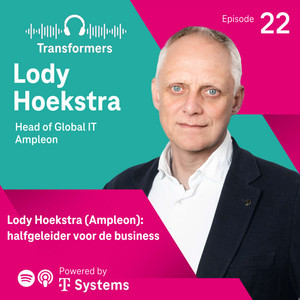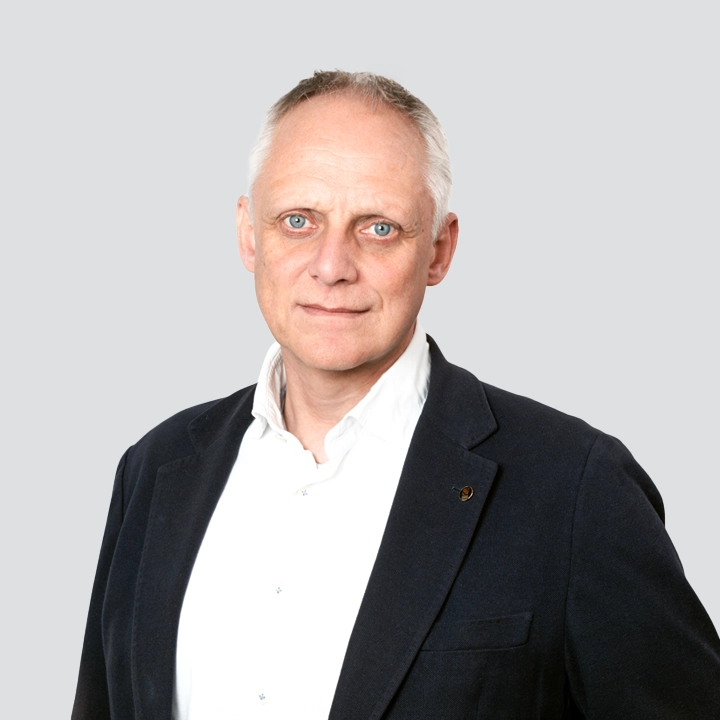In the new episode of the podcast Transformers, manufacturing industry expert Mark ten Broecke and Sebastiaan van Essen spoke with Lody Hoekstra, Senior Director of Global IT at Ampleon. Lody explains how he and his team completely rebuilt the IT infrastructure from scratch, avoided legacy systems, and opted for a lean IT model. He also shares how Ampleon keeps its passion for IT entrepreneurship alive.

Het Nijmeegse Ampleon is een van de edelstenen die de Nederlandse halfgeleiderindustrie rijk is. Tien jaar geleden op eigen benen gekomen, als spin-off van stadgenoot en semiconductor fabrikant NXP. Hoe stapte Ampleon uit de kinderschoenen en tuigde het zijn eigen IT op? Daarover spraken maakindustrie-expert Mark ten Broecke en Sebastiaan van Essen met Lody Hoekstra, Head of Global IT bij Ampleon. Zo zet Lody onder meer uiteen hoe hij en zijn team deIT-infrastructuur helemaal opnieuw hebben opgebouwd, legacy vermeden en voor een Lean IT-model gingen. En hoe Ampleon zijn passie voor IT-ondernemerschap levend houdt.
We are still at the beginning of the year, so we are reviewing our strategy for the coming year and the long term. We are heavily focused on budgets and looking ahead at which suppliers we can best rely on for our future.
I spend most of my time in Nijmegen. Ampleon has 16 locations worldwide, including a factory in the Philippines, which I visit regularly, but much less than before. Since COVID, travel has been limited to what is absolutely necessary.
Yes, it is a fascinating business. We operate in the world of chips, which means we are not well-known to the general public because we don't focus on consumer products. We are a spin-off from NXP, established in 2015 and fully operational since 2016. While we are a young company, we have 60 years of experience and employ about 1,500 people across 16 locations, with our own factory in the Philippines. Our technologies are mainly focused on LDMOS, but we’re increasingly switching to GaN, especially in telecom applications like the signal amplifiers you see on 4G and 5G base stations.
We are diversifying into consumer products, though we don’t sell directly to consumers. For instance, we work with a Korean skincare company that uses RF technology for skin treatments.
NXP had to let us go after acquiring another company, which would have made them too large. So, we became independent in 2016.
What you often see with other former Philips companies is that their technology still carries a lot of heritage from their Philips days. Over time, they gradually lose that heritage. We chose a different strategy. When we became independent, we decided to rebuild our IT from scratch, with minimal legacy systems. The only exception is that some things are so deeply embedded in our ERP systems that they cannot easily be separated. This mainly applies to interfaces with customers, suppliers, and other processes. We have kept everything as streamlined as possible, immediately opting for a strategy that matched our size, goals, and initiatives.
It had already been set in motion when I joined, and a few solid pillars had been put in place. The decisions I make today are built on those foundations. However, back then, it was still a bit of a "cowboy world" because the main focus was on breaking away as quickly as possible. Structuring it properly and giving it real shape became the next challenge.
Eight years ago, my team consisted of about 5-6 people. We’ve grown slightly since then, but we still rely heavily on partners.
We treat partners as part of our team. They are integrated into our processes, and we maintain clear communication and escalation lines. We hold regular operational and business review meetings to ensure we’re aligned.
Our IT strategy is built on security, flexibility, and scalability. We have adopted a cloud-first approach, hosting almost everything in the cloud, with the exception of critical factory operations in the Philippines.
In the Netherlands, my team is still small, consisting of about six people, while in the Philippines, there are around ten. We’ve added responsibilities like information security, which is increasingly crucial.
It’s fantastic. Culturally, the Philippines is closer than you might think. The people are well-educated, speak good English, and share similar values to Europe, as it is a predominantly Catholic country.
We ensure clear communication, establish escalation lines, and conduct regular reviews. We also involve partners in our roadmaps and decision-making processes.
Our strategy revolves around security, flexibility, and scalability. We have chosen a cloud-first approach, with most of our applications hosted in the cloud.
Around 60% of our applications are SaaS-based. We aim for flexibility and try to avoid long-term vendor lock-ins.
We avoid long-term contracts, except for critical systems like ERP. We focus on functionality and interfaces, and we’re not afraid to migrate if necessary.
It’s a mix of cost, functionality, and trust. We regularly review contracts and are open to change if it benefits the business.
Yes, primarily Azure, but we also use AWS for specific applications like AR and simulations.
We deploy instances with code, making it easy to switch between platforms. This keeps our suppliers sharp and ensures flexibility.
We are ISO 27001 certified, which helps us manage security across the board, including in our supply chains and partner ecosystems.
We’ve evolved from doing everything for internal customers to training them to handle data analysis and visualization themselves. Now, they’re more involved in making data-driven decisions.
We started with partners but have since trained our own team, especially in the Philippines, to support the business.
We’ve implemented a system to track products through the factory, ensuring quality and allowing us to trace issues back to their source.
We’re moving from a reactive to a proactive approach, using data to predict maintenance needs and optimize yields without compromising quality.
We develop applications with our customers, but we retain ownership of our intellectual property. We see ourselves as partners, not just suppliers.
We treat partners as part of our team, ensuring they are integrated into our processes and decision-making.
AI is already embedded in many of our tools, but we’re now defining a long-term strategy to leverage our data effectively.
I have a strong software background, although I try not to get too involved in the technical details these days. I focus more on the business side.
I learned to think differently and focus on customer needs. That mindset has stayed with me.
Ampleon’s flat structure allows me to make a difference and exercise my entrepreneurial spirit within the company.
We are focused on flexibility and scalability to manage the ups and downs of the semiconductor market.
We are reflecting on our growth and maturity, simplifying processes, and ensuring we are prepared for future challenges.
We are ISO 27001 certified and regularly practice disaster recovery and business continuity scenarios.
We take a broad approach, considering supply chains, partner ecosystems, and ensuring compliance with regulations.
Yes, absolutely. We have no intention of changing that. Our headquarters are based in the Netherlands, and we would like to keep it that way. While we also have offices in Toulouse, France, and China. We leverage the expertise from regions with strong universities and knowledge hubs, but the core of that expertise remains in the Netherlands, specifically in Nijmegen, at our headquarters. This is something we intend to preserve. In terms of talent acquisition, things are going really well, although it is a challenge, especially in niche markets.
Our competitors are also targeting the same talent pool, so there’s definitely a lot of competition.
About the author
I am 60 years old. All my kids are out of the house and have found their own paths. My passions are skiing and kitesurfing. But yes, life also brings other things, and I am responsible for IT and information security at Ampleon in Nijmegen.

Senior Director Head of Global IT